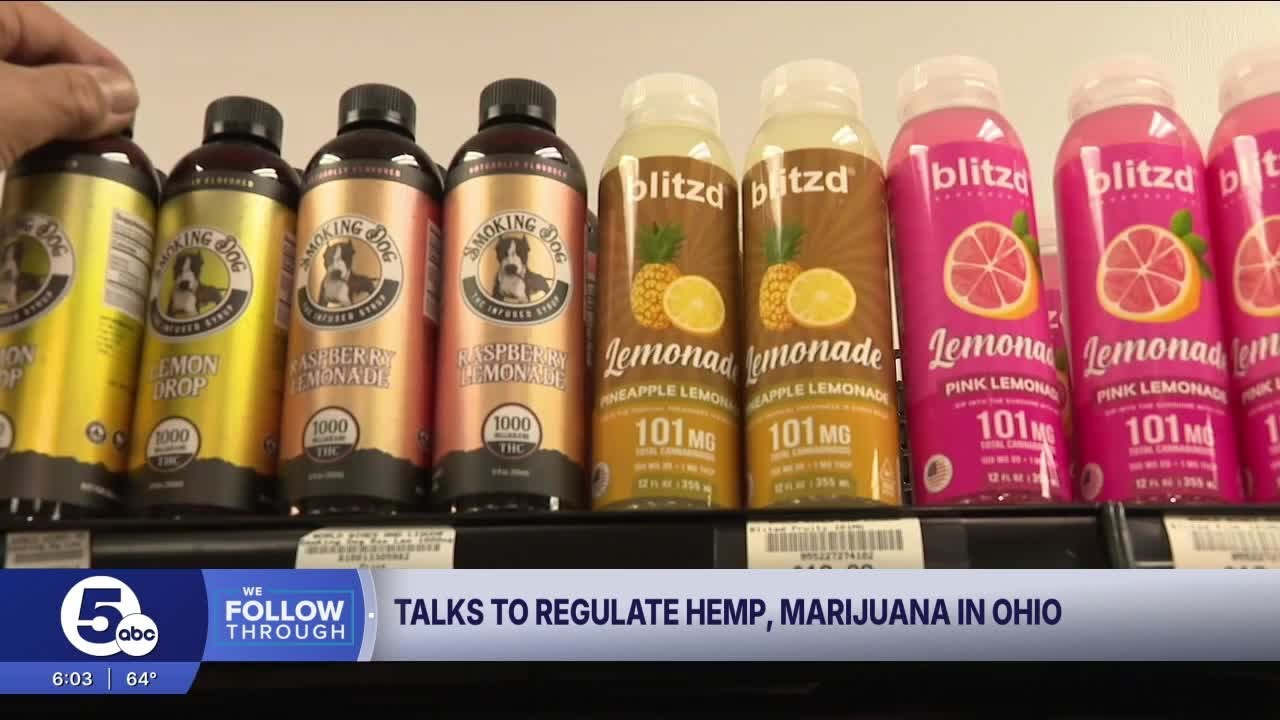Politics
Ohio Lawmakers Will Take Up Bill To Revise Voter-Approved Marijuana Law And Add Hemp Market Restrictions This Week

Ohio House lawmakers are set to take up a Senate-passed bill on Tuesday that would make significant changes to the state’s voter-approved marijuana legalization law—but with new key amendments that are expected to strike much of the current language and refocus the proposal on regulating intoxicating hemp products.
After months of back-and-forth between the House and Senate on how to navigate cannabis policy since adult-use legalization took effect, the latest plan is to take SB 56, sponsored by Sen. Stephen Huffman (R), and scale back controversial proposed restrictions on the marijuana market, while inserting provisions aimed at preventing youth access to consumable hemp.
The legislation would still address the state’s recreational marijuana program, however, with provisions touching on tax revenue allocation, according to a key lawmaker.
Rep. Jamie Callender (R), who has led the charge on marijuana policy in the House, told News 5 Cleveland that the forthcoming revised bill that’s scheduled for a hearing before the House Judiciary Committee on Tuesday will be “very thoughtful and targeted.”
Under the planned amendment, stores and breweries would be permitted to sell THC beverages, with new advertising restrictions meant to prevent appealing to youth.
“It will have a pretty complete ban other than the beverages, but it’s a temporary ban while some rules are being able to be developed so that will give more time,” Callender said. “But in the meantime, it will take the high-THC content stuff off the shelves, at least temporarily.”
The legislative effort on hemp comes after the governor issued an executive order temporarily banning intoxicating products derived from the crop, though that was later blocked by a judge pending litigation.
“Frankly, the legislature had not taken action,” Gov. Mike DeWine (R) said. “I’m still hopeful that the legislature will come in and actually take action.”
House Speaker Matt Huffman (R) commented on the relative lack of progress in advancing marijuana and hemp legislation since voters approved legalization at the ballot in 2023, noting substantive divides within the Republican caucus.
There are “folks who believe that marijuana should be legalized and regulated,” others “who believe that the hemp products should be on equal standing with everything that happened in the initiated statute and then “folks, like me, who are prohibitionists, who don’t think it should be legalized at all and it should be rare,” he said.
“I would say the prohibitionists have largely lost this discussion.”
The potential elimination of prohibitive marijuana rules in the current bill–which includes halving the number of plants adults could grow, adding new criminal penalties and removing select social equity provisions—might be welcomed by advocates and certain stakeholders. But the hemp industry is already sounding the alarm about the addition of policies they say could threaten the market.
For marijuana, the idea is that the legislation will be revised to ensure that tax dollars from adult-use sales are distributed to local governments “the way we had promised” and that “voters had promised,” Callender said.
Although the language has not yet been released, the U.S. Hemp Roundtable on Monday issued an alert warning that the proposal could “severely restrict access to many hemp products now sold at retail.”
“They are considering banning sales of many products now found in places like health food markets, groceries, and CBD stores and limiting sales to a small number of newly created ‘hemp dispensaries,'” the organization said. “We urge you to contact your state legislator today and tell them how important it is to your business and your customers to maintain broad retail access to hemp products in Ohio.”
Callender was asked why he thought it prudent to combine marijuana and hemp regulations in the pending bill, rather than simply move forward with a standalone measure dealing only with hemp as the chambers continue to debate marijuana rules.
“I think we may still end up going there if we have to,” he said. “If we put it all together, it may be harder for the Senate to say no to some of the marijuana things that we feel strongly about.”
“They can either accept it or not accept it,” he said. “If they don’t, it’ll go to conference committee, and it will force the chambers to work the issues out.”
Tuesday’s scheduled committee hearing comes weeks after DeWine issued emergency rules prohibiting the sale of intoxicating hemp products for 90 days, with instructions to the legislature to consider permanent regulations. Last week, however, a county judge enjoined the state from enforcing that policy in response to a legal challenge.
—
Marijuana Moment is tracking hundreds of cannabis, psychedelics and drug policy bills in state legislatures and Congress this year. Patreon supporters pledging at least $25/month get access to our interactive maps, charts and hearing calendar so they don’t miss any developments.
![]()
Learn more about our marijuana bill tracker and become a supporter on Patreon to get access.
—
Meanwhile, last month, the Ohio Department of Cannabis Control (DCC) filed new proposed rules to build upon the state’s marijuana legalization law, laying out plans to update regulations on labeling and packaging requirements.
The proposal came weeks after Ohio medical and adult-use marijuana sales officially crossed $3 billion, data from the state Department of Commerce (DOC) shows.
The state sold about $703 million in recreational cannabis in the law’s first year of implementation, according to DCC data.
In March, a survey of 38 municipalities by the Ohio State University’s (OSU) Moritz College of Law found that local leaders were “unequivocally opposed” to earlier proposals that would have stripped the planned funding.
Meanwhile in Ohio, adults as of June are able to buy more than double the amount of marijuana than they were under previous limits, with state officials determining that the market can sustainably supply both medical cannabis patients and adult consumers.
The governor in March separately announced his desire to reallocate marijuana tax revenue to support police training, local jails and behavioral health services. He said funding police training was a top priority, even if that wasn’t included in what voters passed in 2023.
Ohio’s Senate president has also pushed back against criticism of the Senate bill, claiming the legislation does not disrespect the will of the electorate and would have little impact on products available in stores.




